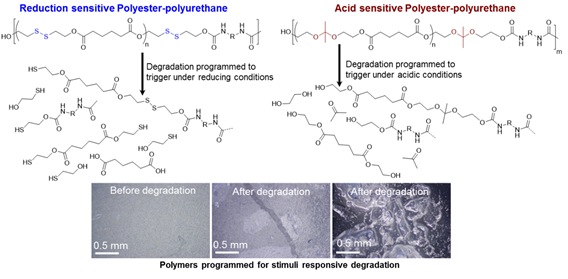
Polymers programmed for stimuli responsive degradation: Redesigning polymers to mitigate plastic pollution
Abstract:
Plastic pollution is among the most critical environmental problems the world faces right now. To address the plastic pollution challenge, we are introducing new molecular designs to develop polymers that could replace some of the conventional plastics while at the same time they could be degraded at the end of their lives in a controlled and programmed manner. To achieve this goal, we are relying on installing functional groups in the polymer backbone that can be cleaved in response to a specific stimulus such as change in pH or exposure to reducing environment. Specifically, we are introducing disulfide and ketal functionalities in the polymer backbone. Disulfide linkage is known to cleave in under reducing environment while ketal functional group cleaves in response to acidic environment. To synthesize disulfide bonds bearing polymer bis(2-dihydroxyethyldisulphide), at slight stoichiometric access, is reacted with adipoyl chloride. The resulting hydroxyl terminated is being reacted with a variety of diisocyanates to produce reduction sensitive polyester-polyurethane films. To synthesize acid sensitive polymers, we are synthesizing ketal group bearing polymer by employing a monomer that contains ketal functional group flanked by the terminal hydroxyl groups. The hydroxyl group terminated ketal group bearing monomer will be reacted with a variety of diisocyanates to produce acid sensitive polyester-polyurethane films. The thermal characteristics (Tm, Tg, and thermal stability), mechanical properties and molecular weight of the resulting polymers will be monitored before and after exposure to reducing agents in case of reduction sensitive polyester-polyurethane films and exposure to acidic environment in case of acid sensitive polyester-polyurethane films. In addition, change in the surface morphology of the films upon degradation is being monitored via imaging through light microscope. These assessments are helping in assessing the programmed degradation of the developed polymers. Chemical characterization of the systems being developed is being carried out using NMR and IR spectroscopies. In summary, this project is expected to produce a variety of polymers exhibiting controlled and programmed degradation, which may replace conventionally used non-degradable plastics and help in addressing the ever-growing challenge of plastic pollution.
Thesis Committee
- Dr. Basit Yameen (supervisor)
- Dr. Irshad Hussain (thesis committee member)
- Dr. Salman Noshear Arshad (thesis committee member)

